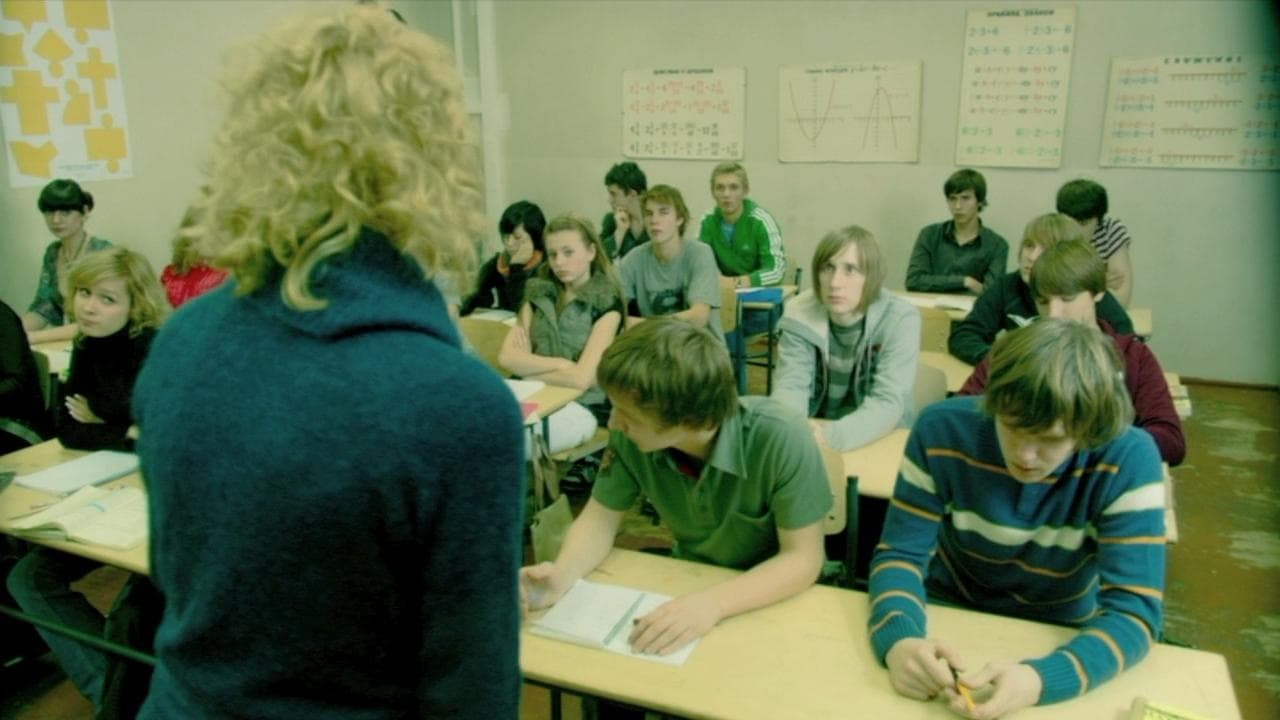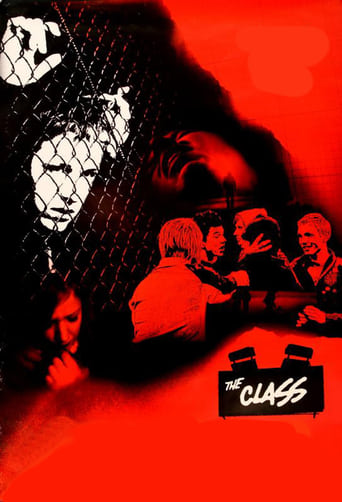



Really Surprised!
Lack of good storyline.
Very interesting film. Was caught on the premise when seeing the trailer but unsure as to what the outcome would be for the showing. As it turns out, it was a very good film.
View MoreI really wanted to like this movie. I feel terribly cynical trashing it, and that's why I'm giving it a middling 5. Actually, I'm giving it a 5 because there were some superb performances.
View MoreI saw this movie not so long ago, on a free exhibition in Estonia. I checked first on IMDb and it showed 8 out 10 voting, which went against the first impression the movie plot gave me, "trying to recreate columbine massacre". Well, that's what it was for me, a try, and it definitely failed.The director was too lazy. Amost every scene in the movie is shot with (bad) hand-held camera mixed with fast cuts that could work on some fast paced scenes but definitely ruin his attempts of trying to create a serious, romantic or minimally delicate conversation that happens sometimes, the empathy we should feel about the bullied kid is just not there. The plot is full of holes, characters are incoherent, with many plot holes where you can put your finger way deep. I don't demand explanations, i just felt some characters were changing personality every different day they went to school.The characters sound totally plot-driven, in a way that their actions are just bordering the surreal sometimes just to make the story work and keep going to the verge of the unacceptable. Anybody who has been bullied before or who has been present in such situations, know things can get hardcore, but man, how hardcore? By the way, where are the school janitors? Cleaning ladies in the corridor? Nobody? Only bully kids around? That school needs some monitoring.The movie wanted to depict the situations that lead kids to bring a gun to school and shoot around, and the director wanted to make sure the audience got it and stood by his side, by pulling the most ridiculous plot trick, a "have-pity-on-me" scene so that we can get on the side of the kid who's shooting and don't feel bad about it. I think that was the lowest and worst thing about the movie, along with terrible storyline where you never really get to know the relations between nobody since the script is only focused on the dialogues that tear the bullied kid's harmony.They divided the movie into chapters so they could use these fast-cut-guy-ritchie-music-video-style parts before the scene really started. It felt really out of context, because the story is told in quite serious molds, or tries to be, and i felt these parts were a sneaky attempt to wake up the short-attention-spam audience watching and get them back into the movie.The final shooting scene, well, you can't get any worse, whereas in scenario, in directing actors or just how it all develops. It doesn't look like a movie scene, it felt they were still rehearsing, the body language, the dialogues and the flow of action is too sloppy and looks too amateur to be the main reason why they made the movie.Directing is lazy, storyline is terrible, photography work is invisible, editing is sloppy and there is nothing in this movie that i could recommend to anybody except for the moral it teaches.Comparing it to Elephant? how dare you.
View MoreHoly mother! It doesn't matter what kind of person you are; if you watch this movie, you will experience the same feelings as the characters: despair, depression, anger, self-disregard, fear and courage.During the movie I cried for the sorrow of a certain character, while hating the other for his actions. Every scene seems to bring a new feeling and it's played so natural as if it was happening 5 feet away from you.Beside that, this film will not force you into old movie clichés, or unreal life heroes or acts of bravery and strenght we're used to see is most of western cinema. This is why this has such a great impact on the viewer: it's real!I don't speak estonian, but the actors, despite very young went perfectly.
View MoreThe law of the jungle is fair and kind compared to the law (or lack thereof) of high school. 16 year old boys can act with the utmost cruelty and viciously attack their peers. Contemporary psychologists call this phenomena bullying. And that's exactly what Joosep is struggling against. He's constantly bullied by a group of abusive boys that act under the guidance of Anders, the alpha male, the ultimate bully.When the boys assault Joosep in the locker room and remove his clothes, leaving him completely naked, Kaspar, a boy that was part of Anders's circle rebels against the abuse and saves Joosep from further mortification. Kaspar then embarks upon an almost impossible task, after all, he is an idealistic adolescent fighting against an abstract threat. He can fend off Anders for a while, but he cannot neutralize bullying as a continued and ever increasing practice in high school.Anders ridicules Joosep persistently, accusing the defenseless boy of being gay. It doesn't matter if Joosep is gay or not, the important thing is that Anders behaves like every other uncouth teen in the world: he relies on the homosexual phantasm in order to articulate himself in the symbolic order and, more accurately, in a place of power within the lawless dynamic of high school.Homosexuality is seen as a synonym of the abject, id est, the vilest, the very lowest condition of man. That's why it's also the most common insult among teens in Western (and perhaps Eastern) society. According to contemporary philosopher Slavoj iek, we should ask here a naive, but nonetheless crucial question: why does the Army so strongly rejects gays? Not because homosexuality poses a threat to the 'phallic and patriarchal' libidinal economy of the military community, but, on the contrary, because the Army itself depends on a disavowed homosexuality as the key component of the soldiers' male-bonding.In fact, in any phallocentric society there will be an insatiable need to humiliate the one who who doesn't act as manly as he should. And if there is no such person then every group of men will create this figure, even if it's as a purely phantasmatic projection of their own fears and insecurities. This of course pertains to high-school, after all, adolescence is a difficult age in which the subject must reaffirm both sexual identity and gender role, something that is made all too clear in "Klass".This flimsy concomitance of extreme and violent homophobia with thwarted homosexual libidinal economy, is evident in high school. That's why it's impossible for the boys to divulge what is really going on in their lives: they cannot explain this to their parents or teachers.Once a popular boy, Kaspar is now labeled as a pariah, joining Joosep in the murky confines of the land of the "losers" (it's fascinating to observe that this dichotomy between popular kids and losers exists not only in the US but also in Estonia). Thea, Kaspar's girlfriend, loses her patience. Why is he defending this pathetic, antisocial boy? For Kaspar is a matter of honor. If Anders represents power, Kaspar is the heroic resistance.Anders is completely obsessed with the alleged homosexual condition of Joosep. Although very subtly, Ilmar Raag's film presents a homophobic that could perfectly be a (furious and frustrated) closeted homosexual. Anders displays an obsessive behavior that obtains libidinal satisfaction out of the very compulsive rituals destined to chastise gays. That's why when he fails to create the fantasy of homosexuality through an elaborate scheme of false e-mails sent to Kaspar and Joosper he chooses a more radical approach.Hazing is a typical masculine ritual. Should this practice be publicly disclosed the very dynamics of the heterosexual normativity would be undermined. Because to consider themselves as straight guys, these boys must depend on a mechanism of self-censorship. Hazing seems to be accepted by adults as long as no one outside school finds out about them. That's why in sports class teachers don't worry about Joosep getting punched. In the same way, Joosep's father gets mad at his son, not because of the hazing but because the hazing has escaped the boundaries of school and has reached their house. The rule is simple: violence can take place as long as it's not discovered.Anders's new trap seems to work at first, when he captures Joosper and Kaspar in the beach. There, he menaces both with a knife; he then proceeds to put Kaspar on his knees and forces him to receive Joosep's penis into his mouth... while filming everything with a digital camera. The hazing, of course, nowadays can be perpetuated through YouTube, Facebook or any other social network. Anders has planned to destroy the two boys, to make them feel so ashamed that they must either leave the school or commit suicide. But once these images are broadcasted online, the required self-censorship gets deactivated; thus vacating the place of power and creating a counter-power.In other words, Anders can no longer be the leader, something made clear by the comments of the boys in his group, who feel disgusted at his actions. The homosexual slandering had been fundamental for them insofar as it had only worked in the dimension of the phantasm. Once homosexuality is embodied by the two victims, everything falls to pieces. After Anders has degraded his two victims, he loses all power, and thus empowers Kaspar and Joosper who now feel compelled to exact revenge on the bully."Klass" is one of the most honest, heartbreaking, cruel and powerful films I've ever seen regarding teenagers, games of power and violence. Once violence escalates we know that tragedy ensues. Reminiscent of productions such as Gus Van Sant's "Elephant" or Murali K. Thalluri's "2:37", Ilmar Raag gets to the core of adolescence and creates an extraordinary story that dissects the nature of power and violence.
View MoreAlmost every class in high school knows one: a lonely child that is being picked on by everyone. Unable to give proper resistance against the different kids in the class that one person becomes the victim of just about everything. Most of the time it ends up OK in the end, but sometimes it goes to a point of no return and then it ends in full flexed drama. This film is about such a drama.Starting out at the point where a kid is picked out as being the one to pick on the events that happen happen in just the right pace. The film switches between fueling the fire and licking the wounds, and later between fueling the fire and planning the counter strike. It becomes impossible not to feel a certain level of sympathy for the guy, even though his actions are unforgivable. And that is why this film works well. Klass is a harsh message and I think it should be shown to all kids in high schools to show them the darkest sides of peer pressure and the effects of it on some people.9 out of 10 difficult lessons
View More